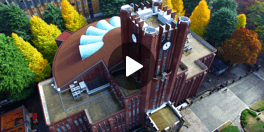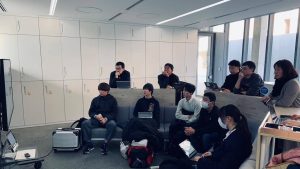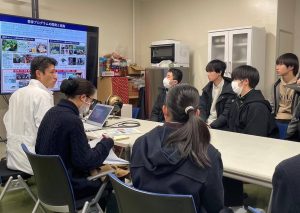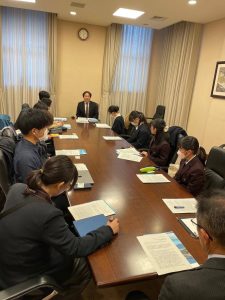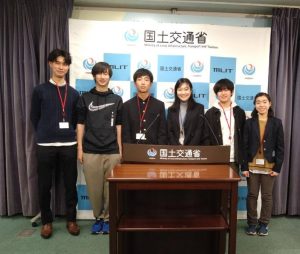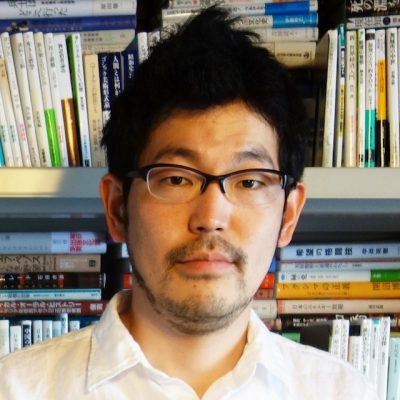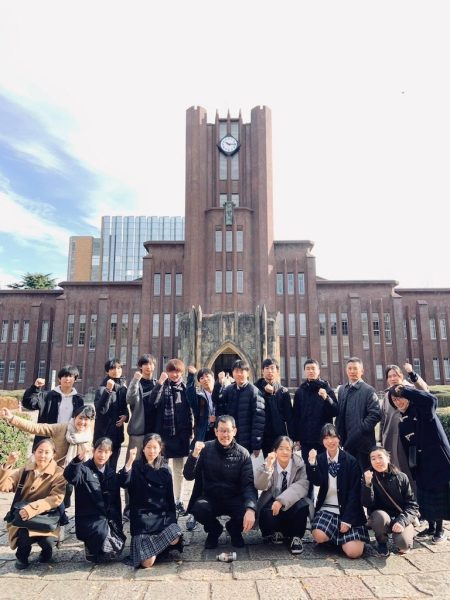
February 2, 2024
レポート:福島学カレッジ・東京フィールドワークReport: The "Fukushima Studies College: Tokyo Fieldwork"
2023年12月26・27・28日の3日間、情報学環を拠点に「福島学カレッジ:東京フィールドワーク」が開催されました。これは開沼博研究室が東日本大震災・原子力災害伝承館(福島県双葉町)とともに企画・運営する中高生向け研究体験プログラムの一環として実施されたものです。
高大連携やSTEAM教育等が注目される中、災害や地域社会の抱える課題、放射線・エネルギーと社会との接点等に関する学際的研究を中高生が自らの手で実践することを目指す本プログラムには全国から12名が参加。キャンパスツアーや霞が関等での聞き取り、学府院生も参加するゼミなどを通し、参加者がフィールド研究の最先端に触れる機会となりました。
キャンパスツアーでは、各学部・研究科等の施設を訪れながら、参加者の関心に沿った研究・教育事例を紹介したり、福島復興に深く関わるアイソトープ研究所教授の秋光信佳先生の元を訪問し「なぜ放射線創薬等の研究者が、東京大学総合研究博物館と楢葉町をつなぎ、ミュージアム開館を実現したのか」その理由や経緯をご説明頂いたりしました。
また、学府の社会人院生らの協力も得ながら実施された霞が関等訪問では、橘清司さん(社会情報学コース/修士課程)から福島県庁への赴任経験を踏まえた行政の復興施策のあり方や福島研究について、馬路ひなのさん(同)から行政官と研究者という「二足のわらじを履くこと」の意義などが語られました。同時に、日本記者クラブを訪問し、メディア・ジャーナリズムの役割についても学びました。
そして、各参加者の研究計画をもとにしたゼミには、福島県浪江町の地域コミュニティの復興を研究する葛西優香さん(社会情報学コース/博士課程)、福島に関する中国国内のSNS言説を研究する卜新哲さん(同/修士課程)らが参加し、各々の視点から参加者と議論をしました。
参加者からは「東大というと遠い存在に感じていたけど、少し身近に感じることができた」(京都教育大学付属京都小中学校・8年)「自分の将来の想像がより膨らみ、今何をしたらよいのか近い年齢の人と考える機会になった」(灘中学校・3年)「新しいものを生み出すことは難しいが、目の前のことに問題点を見出す力をつければ新しいものが生まれることがわかった」(福島高校・1年)「福島の復興の中で生まれた技術が、他の地域にも活かせるという考え方は面白かった。もっと調べたい」(安積高校・1年)といった感想がありました。
社会における大学の位置づけ、高等教育と中等教育との関係性が変化する中、本プログラムのような実践は、その変化がいかなる方向に進むべきか、一つの可能性を示すかもしれません。今後も、学環・学府の環境を活かしながら、このような機会の創出を継続していく予定です。
〈LINKS〉福島学カレッジWEB: https://www.fukushimagaku-c.org/
記事・写真:開沼博(准教授)
The “Fukushima Studies College: Tokyo Fieldwork” was held over three days, December 26-28, 2023, based at the Interfaculty Initiative in Information Studies. This event was part of a research experience program for middle and high school students, planned and operated in collaboration with the Hiroshi Kainuma Laboratory and The Great East Japan Earthquake and Nuclear Disaster Memorial Museum (located in Futaba Town, Fukushima Prefecture).
Amid growing attention to higher education collaborations and STEAM education, this program aimed to enable students to engage in interdisciplinary research on topics such as disasters, societal challenges, and the intersection of radiation, energy, and society. Twelve students from across the country participated and experienced the cutting edge of field research through activities like campus tours, interviews with officials in Kasumigaseki, and seminars with graduate students.
During the campus tour, participants visited various faculties and research departments, learning about research and educational initiatives aligned with their interests. They also met with Professor Nobuyoshi Akimitsu at the Isotope Research Center, who is deeply involved with reconstruction in Fukushima, and learned about his role in connecting the University Museum with Naraha Town and the establishment of The Great East Japan Earthquake and Nuclear Disaster Memorial Museum.
The visit to Kasumigaseki, conducted with the support of graduate students and professionals, featured insights from Kiyoshi Tachibana, a Master’s student in the Social-information and Communication Studies Course, on reconstruction policies based on his experience at the Fukushima Prefectural Office, and from Hinano Baji, another Master’s student in the same course, on the significance of balancing her role as both an administrator and a researcher. Participants also visited the Japan National Press Club to learn about the role of media and journalism.
The seminar, based on the participants’ research plans, included discussions with Yuka Kasai, a Ph.D. student in the Social-information and Communication Studies Course, who is studying the reconstruction of the Namie Town community in Fukushima, and Xinzhe Bu, a Master’s student in the same course, researching Chinese social media discourse on Fukushima. These discussions provided different perspectives for the participants.
Among the feedback from the participants, one student said he gained a clearer vision of his future and understood the importance of identifying problems in immediate tasks to generate new ideas. Another participant was intrigued by the idea of applying technologies developed in Fukushima’s reconstruction to other regions.
In a changing landscape where the roles of universities in society and the relationship between higher and secondary education are evolving, programs like this may suggest possible directions for these changes. The III and GSII plan to continue creating such opportunities in the future.
〈LINKS〉Fukushima College WEB(Japanese): https://www.fukushimagaku-c.org/
Text and Photos: Hiroshi Kainuma (Associate Professor)
English proofreading: David Buist (Project Senior Specialist)
主担当教員Associated Faculty Members
准教授
開沼 博
- 社会情報学コース
Associate Professor
KAINUMA, Hiroshi
- Socio-information and communication studies course

